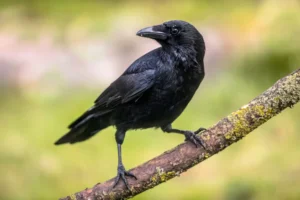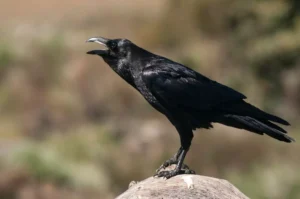Crows, with their jet-black plumage and piercing eyes, have always captured human imagination. Throughout history, various cultures have attributed diverse symbolic meanings to these enigmatic birds, making them subjects of intrigue and fascination.
When a crow crosses your path, it is commonly perceived as a sign or omen. Some believe it may herald change or transformation, while others see it as a message from the universe, indicating a pivotal moment in one’s life journey.
Crows have left their mark not only in folklore but also in our daily lives. They’re intelligent, adaptable, and often observed in both urban and rural landscapes. Their frequent interactions with humans have fueled stories, superstitions, and interpretations that have been passed down through generations.
Crow Symbolism in History
Ancient Civilizations and Their Crow Beliefs
Crows have been symbolic entities for as long as human history has been recorded. In ancient civilizations, these birds held various symbolic meanings, often steeped in the realm of the mystical.
In Ancient Egypt, the crow was linked to magic and mysticism. The crow was considered a guide, helping souls in their afterlife journey. Egyptians revered the crow, associating its cawing with the announcement of a significant event or change.
The Greek pantheon features the crow prominently. Linked to the god Apollo, crows in Greek mythology acted as messengers. Aesop’s fables also highlight crows, often attributing them with wisdom, but sometimes cunning.
Norse mythology viewed crows with much reverence. The god Odin had two crows, Huginn (thought) and Muninn (memory), which would fly across the world, gathering news and whispering it into Odin’s ears.

Spiritual Connections and Cultural Variations
Beyond mythology, spiritual interpretations of crows are widespread. In many cultures, the crow holds a special, often sacred place. Their appearance is frequently viewed as a spiritual message or a sign from the divine.
Native American traditions, for instance, see the crow as a symbol of transformation. It’s believed that the crow has the power to shape-shift into any form, embodying the essence of change, magic, and creation.
In Celtic cultures, crows are seen as gatekeepers to the otherworld. Their presence might signify a portal between our reality and the spiritual realm, serving as a bridge between life and death.
Interpretations of a Crow Crossing
Spiritual Significance
One of the most widespread beliefs is that a crow crossing your path has a particular spiritual message. Often, this interpretation varies, rooted deeply in personal beliefs and cultural background.
For some, a crow might act as a messenger, indicating an impending change or a transformation. This could range from an imminent life event, like a shift in career or personal relationships, to more profound spiritual awakenings.
Others view this encounter as a moment for introspection. It prompts an inward journey, urging one to reflect upon past actions, choices, and paths taken. The crow, in this perspective, serves as a mirror, reflecting back one’s innermost thoughts and emotions.
Cultural Perspectives
Crows elicit different reactions across the world, and cultural interpretations play a significant role in shaping these views.
In some Asian cultures, a crow cawing near your house is seen as an announcement of a visitor’s arrival. But, in contrast, in other cultures, the same event might signify bad luck.
In Western cultures, literature, especially works like Edgar Allan Poe’s “The Raven,” has painted the crow (or its larger counterpart, the raven) as a symbol of impending doom or melancholy.
However, it’s essential to understand these interpretations are shaped by societal beliefs, stories passed down generations, and the interplay of cultural narratives over time.
Crow Behavior: Science Speaks
Natural Behaviors of Crows and Misconceptions
Despite the numerous myths and stories surrounding crows, it’s essential to distinguish between folklore and actual behavior.
Crows are highly intelligent birds. Their ability to solve problems, mimic sounds, and even recognize faces showcases their cognitive prowess. Often, their actions, like gathering around a deceased bird, might seem mysterious to us but have a rational explanation. For instance, this behavior is believed to be a learning moment for crows, understanding potential threats in their environment.
What Researchers Say About Crows and Their Interactions with Humans
Researchers have always been fascinated by crows. Numerous studies have delved into understanding their behavior, especially their interaction with humans.
One groundbreaking study highlighted that crows could remember human faces. If a person posed a threat to them, crows not only remembered the individual but also taught other crows to recognize and react to that person.
Another aspect of crows that has intrigued scientists is their ability to use tools. From using sticks to fetch insects from tree barks to dropping nuts on roads for cars to crack them open, their problem-solving skills are truly remarkable.
In essence, while cultural stories and personal beliefs add a layer of mystique to crows, science offers a more grounded perspective, painting a picture of an intelligent, adaptable, and truly fascinating bird.

Contemporary Views on Crows
Pop Culture Influence
Crows, with their striking black feathers and enigmatic presence, have found their way into many facets of pop culture.
Crows in Movies, Books, and Music
From classic literature to modern movies, crows have been depicted in varied roles. They’ve been messengers, spies, and even harbingers of doom. In J.R.R. Tolkien’s Middle Earth saga, crows named Crebain act as spies for the dark forces. Similarly, films like The Crow present these birds as symbols of vengeance and rebirth.
Music has not been left untouched. Bands and songs have drawn inspiration from the mystique surrounding crows. Lyrics often use crows as metaphors for change, mystery, or even impending challenges.
How Media Shapes Our Perspective
The portrayal of crows in media significantly influences our perception. For many, their only interaction with these birds might be through screens or pages, building an image based on fictional narratives. This representation, more often than not, leans into the bird’s mysterious and sometimes ominous reputation.
Modern Spiritualism and Crows
Contemporary spiritual beliefs and practices still hold crows in high regard, often attributing significant meaning to their appearances or actions.
Current Spiritual Practices and Crow Encounters
Today’s spiritual enthusiasts often regard crows as spirit guides or totem animals. When they appear in meditation or dreams, they’re thought to convey messages from the universe. Some modern tarot card interpretations also feature crows, symbolizing transformation or profound introspection.
The Role of Crows in Modern-Day Divination
In divinatory practices like tarot reading or rune casting, crows can signify various things based on context. Often associated with The Tower card in tarot, they can hint at a significant change or upheaval. In runes, the crow can symbolize foresight or keen observation, drawing from their reputed intelligence.
Practical Approach to Crow Encounters
While the myths, media portrayals, and spiritual interpretations offer a plethora of ways to view crows, it’s equally essential to approach crow encounters practically and responsibly.
Respecting Wildlife and Their Habitats
Regardless of personal beliefs or cultural interpretations, it’s vital to treat crows with respect. Like all wildlife, they play a role in the ecosystem. Efforts should be made to:
- Avoid disturbing their habitats
- Appreciate from a distance, refraining from attempting to feed or touch them
- Protect their environment by promoting green practices and reducing pollution
Understanding Coincidence vs. Significance
Every encounter with a crow might not have a profound meaning or spiritual implication. Often, it’s just a bird going about its day. While it’s tempting to seek symbolism in every flutter or caw, sometimes a crow is just a crow. It’s essential to strike a balance between appreciating their role in culture and understanding the natural behaviors of these fascinating birds.
FAQs
Why are crows considered omens?
Crows have often been associated with mystery and magic. Their intelligence and behaviors, combined with their appearance in various mythologies as messengers or symbols of change, have led to their perception as omens.
Do all cultures view crows negatively?
No, while some cultures might see crows as harbingers of bad luck or death, others view them positively, symbolizing transformation, adaptability, or even bringing messages from the divine.
How intelligent are crows?
Crows are among the smartest birds. They possess problem-solving skills, can recognize human faces, and have even been observed using tools, showcasing their remarkable cognitive abilities.
What should I do if a crow crosses my path?
It’s essential to respect wildlife. While some might interpret a crow’s presence spiritually, it’s also crucial to understand that crows have natural behaviors. Trust your intuition and personal beliefs, but also appreciate the crow as a part of nature.
Conclusion
The allure of crows lies in the fine balance between their presence in our tangible world and their depiction in the realm of beliefs and tales. Their daily interactions with us, coupled with the vast tapestry of stories we’ve woven around them, make them undeniably captivating.
While folklore and superstitions provide a romanticized interpretation, it’s essential to recognize the crow for what it genuinely is – a remarkable bird with intelligence and adaptability. Regardless of what one might believe, a crow’s encounter serves as a reminder of nature’s intricate web, where every creature, big or small, plays a role.
In the end, the meaning of a crow crossing your path might be deeply personal, influenced by beliefs, experiences, and one’s unique journey. Embrace the moment, cherish the mystery, and continue forward, carrying the wisdom of both nature and narratives.
Is the crow telling me that my ex boyfriend going to die early or is he going to die later in his life
Dear Jessica,
Thank you for sharing your thoughts. It’s important to remember that while crows have various symbolic meanings in different cultures and traditions, they are, in essence, wild creatures exhibiting natural behaviors. The presence or behavior of a crow should not be interpreted as an omen or prediction about specific life events, especially something as significant and sensitive as a person’s life span.
If you’re experiencing concerns or anxiety about personal relationships or life events, it might be beneficial to speak with a professional counselor or therapist who can offer guidance and support.